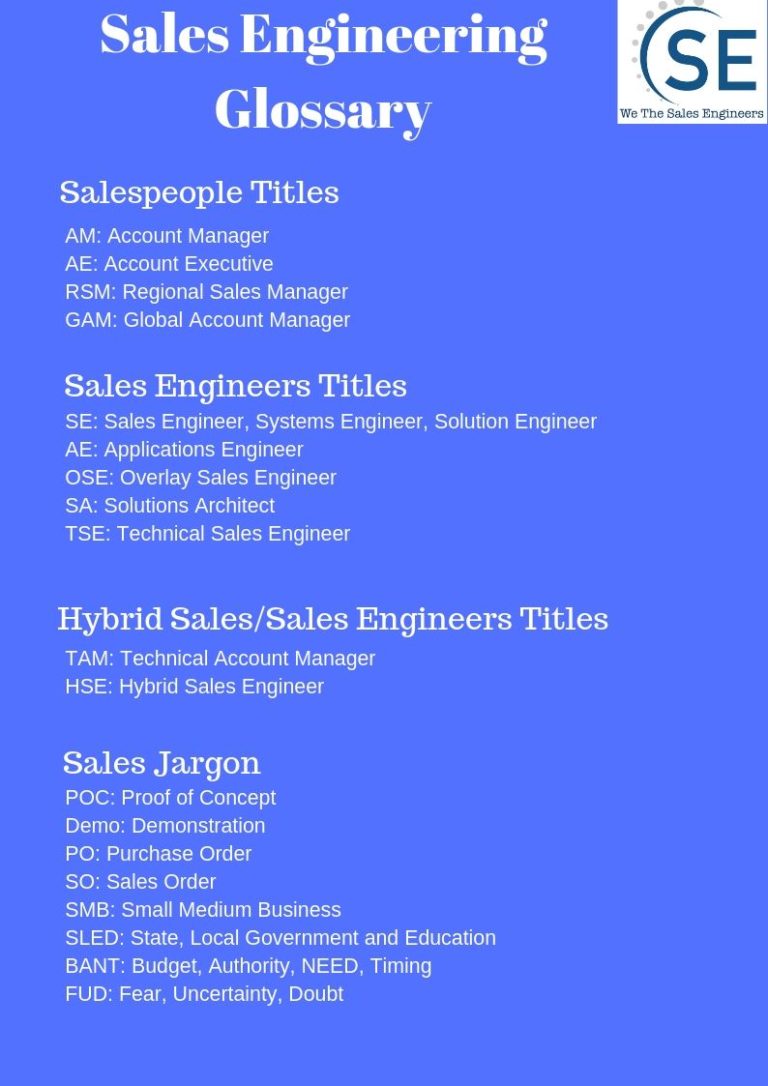Is this even a question that I’m allowed to ask? Who am I to ask it? A lowly sales engineer? What gives me the right to question my sales guy?
The answer is I am half the sales team, and important half, and I don’t ask the question….initially.
After having discussions with multiple people I found a common trend. SEs and AMs don’t always see eye to eye. In the end, it is the AM’s call on what action to be taken next. You may not report to the him, but if you cannot convince him of something, you will have to follow his lead.
For this article, I’ve classified AMs into 3 groups. The first group is the new AM joining an existing and established SE. Second group is the existing AM who has had a good track record of hitting his numbers on a consistent basis. The third group is the existing AM who doesn’t have that good track record, and (s)he is struggling. I’ll also touch on how trust can be built.
Now, what is a Sales Engineer, or a Systems Engineer, or an Application Engineer, or a Technical Sales Engineer, or a pre-sales Engineer? Way too many names for the same thing.
Let’s talk about the first groups of AMs. Here’s the situation that they run into. The sales engineer has been at the company for a few years. He’s an established SE, who knows the products and the customers very well, and in comes a newbie AM. He doesn’t have to be new to sales, just to the company. He only has some credibility at this point. His actions over the next few months can either build trust, or destroy it. It’s like being thrown into an arranged marriage, where the one person is calling all the shots, and the other still has no idea how to talk to him about it.
Photo by Blake Newman from Pexels
SEs should always try to start off with a bit of trust and optimism, but here’s a few things that can kill trust. Note that it is not just one thing, its a combination of multiple “annoyances” over time.
1- Asking the same question over and over:
Hey SE, how do we submit this form to get this end result. A few days later, hey SE, how do we submit this form to get this end result. On and on we go. Not a deal breaker. The AM is busy learning new products, trying to find new logos, and trying to close deals, all while management is breathing down his or her neck to update the forecast which they were never involved in creating in the first place. So I can understand the confusion, at first. Then it gets old.
2- Giving out incorrect info to the customer:
This is a very frustrating problem. Especially if they are showing Michael Jordan’s confidence while taking a free throw with his eyes closed. Now you have to tiptoe around a conversation to make sure the customer gets the correct info without insulting the AM. It’s not the AM’s feelings I’m worried about. Customers don’t like it when SE/AM team degrade each other in front of them. It does not build trust with the customer, so here the SE goes trying to find a diplomatic way, or at least he should be, to politely tell the AM that he has no idea what he’s talking about and he should leave the technical info to the technical people. Keep in mind, this is a one on one conversation that will have to take place after the call between the SE and the AM. Don’t just let it go, it will happen again if you do.
3- Setting up meetings without an agenda.
Every meeting should have an agenda. We should know what we are trying to accomplish in a meeting to push a sales forward, and how we are trying to do it. “Oh we’re just going to see them to see how they are doing” is not an agenda. If that is the purpose of the call, the SE does not need to be there. If there’s an agenda, and if the AM has an idea of the problem the customer is trying to solve, the SE can prepare for the meeting more efficiently.
4- Promising a demo without including you on a discovery call
I am an SE, hear me RANT. This is the biggest pet peeve of mine, and here’s a story that actually happened to me. I’m brand new to the job, walking down the corridor at a customer site meeting and helping people. Out of a meeting room in front me walks out a former Sales Director, and my AM. The director looks at me and says, you have a demo on Friday on this product. Suffice to say, I was confused. Our product solves many problems. Which one did they want to solve? Is there a specific flavor of the product they are interested in? It is Wednesday afternoon, I’m supposed to demo this on Friday?
I never let that Director meet anyone without me present after that point. Setting us up for failure is a good way to lose my trust.
5- Not knowing what problem the product solves after being on the job a significant amount of time.
After being on the job for some time, the AM should be able to know what problem each of the products solve. Also should know how to combine products, thus, yes I said thus, creating solutions for customers that could solve more problems. If after a year or even two, the AM doesn’t know this, then he is not very useful on qualification calls, discovery calls or any other calls until the SE hands him the proposal to price, propose then close. Even then, the AM will have a hard time defending the proposal since he does not understand the solution being provided.
That being said, I want to talk about how my Account Manager built trust with me since I was in the position above less than two years ago.
1- Let me lead conversations for the first few months.
He learned by listening to me ask questions and understand their situation to come back in another meeting and offer a solution that could work for them. He asked me many questions, and took copious amounts of notes. BTW the word “copious” was recommended by google docs, so hopefully I’m using it correctly.
2- He quickly developed relations with the customers.
One of the main responsibilities of sales people is to build relationships with customers. In general, people don’t buy from people they don’t like unless they absolutely have to. They don’t have to fall in love with the sales person, just know that he is a reliable human being that is not trying to suck them dry.
3- He isn’t afraid to ask for a purchase order (aka closes deals)
When the technical close is done, if the AM is doesn’t ask the customer if he wants to buy and the customer is on the fence for one reason or another, he will never find out. Asking for the order brings out any concerns to the surface. If we don’t know what the customer concerns, then we cannot actually address those and alleviate those concerns. As John Haldi mentioned in on the podcast customers are afraid to buy since if they make a wrong decision, it is their fault. This is a topic for another post though, so moving on.
4- We worked together on a strategy to close deals by providing acceptable options.
Being new to the team, he showed great humility by always asking my input on how we can package a proposal to get the deal. He recognized that I knew the customers better, and what they can or cannot do, and put his ego aside to get things done. This gave me great confidence that if something is bothering me, I can talk to this guy and work together to find a solution.
Now, how can you trust an existing AM who has been hitting their numbers consistently? Easily! Oh but they can do better! That’s possible, but are you willing to do the job? Do you want to have multiple people a day hang up on you during a cold call? Do you want to laughed at? Do you want to get calls at 8:00 pm from your boss asking why you have not closed this deal? Try to explain that their budget has been slashed and see what happens. If he is doing his job, and you are doing yours, and you are both hitting your numbers, you both should be happy.
Finally, we have existing AM who have not been doing well. It is very hard to trust that AM. But focus on what you can control. Do the best to get the deal as close to being closed as possible. Do everything in your power where all the AM has to do is ask for the purchase order, and he will get it. You are not doing this to save his job, you are doing it to feed your family since commission is an important part of our payment structure. And sooner or later, management will be looking into them to either help the AM improve their performance, or look into replacing them. If they get replaced, then see scenario 1 above.
If you are having a hard time hitting your number, talk to your manager and make sure they understand the situation. Document everything, and use the CRM to update the opportunities that you are working on.
Bottom line, SEs in general work very closely with their AM. Sometimes SEs and AMs will butt heads, sometimes it will work greatly. But unless you have a rockstar AM, there will always be that thought: “Why is he doing it this way?” or a million other variation. From my experience talking to other SEs, that seems to be very normal.
Let me know how you guys function with your AM, I’d love to hear from you.


